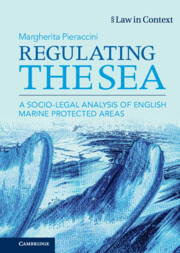Book contents
- Regulating the Sea
- Law in Context
- Regulating the Sea
- Copyright page
- Contents
- Preface and Acknowledgements
- Table of Cases
- Table of Legislation
- Abbreviations
- Introduction
- 1 The Geography of Regulation
- 2 Multi-level Regulation of English Marine Protected Areas
- 3 Impact Assessments for Marine Protected Areas
- 4 Risk-Based Regulation
- 5 Marine Conservation Zones Designation
- 6 Environmental Democracy in Marine Protected Areas Management
- 7 Climate Change and Marine Protected Areas Network
- 8 Marine Protected Areas Regulation in the Context of Regulatory Uncertainty and Change
- Concluding Remarks
- Bibliography
- Index
5 - Marine Conservation Zones Designation
Whose Voices Have Been Included?*
Published online by Cambridge University Press: 15 December 2022
- Regulating the Sea
- Law in Context
- Regulating the Sea
- Copyright page
- Contents
- Preface and Acknowledgements
- Table of Cases
- Table of Legislation
- Abbreviations
- Introduction
- 1 The Geography of Regulation
- 2 Multi-level Regulation of English Marine Protected Areas
- 3 Impact Assessments for Marine Protected Areas
- 4 Risk-Based Regulation
- 5 Marine Conservation Zones Designation
- 6 Environmental Democracy in Marine Protected Areas Management
- 7 Climate Change and Marine Protected Areas Network
- 8 Marine Protected Areas Regulation in the Context of Regulatory Uncertainty and Change
- Concluding Remarks
- Bibliography
- Index
Summary
This chapter focuses on the process of designation of MCZs in English waters at the basis of MCZs designation. The designation of MCZs is a very interesting case to study attempts at democratising conservation regulation as it has contemplated extensive participation. Departing from the technocratic and purely science-based approach to site selection typical of domestic and European nature conservation law, socio-economic considerations and participatory techniques have been key elements of the designation process of MCZs in England from the start. However, a critical reading of the participatory approach reveals certain weaknesses, mainly to do with the choice of an aggregative rather than a deliberative model of democracy. Advocating for a relational ontology and epistemology, the chapter ends with a call for bringing forth new, ‘thicker’ models of participation that are more attentive to multiple forms of communication and identities and more conducive to commoning practices.
Keywords
- Type
- Chapter
- Information
- Regulating the SeaA Socio-Legal Analysis of English Marine Protected Areas, pp. 94 - 109Publisher: Cambridge University PressPrint publication year: 2022

